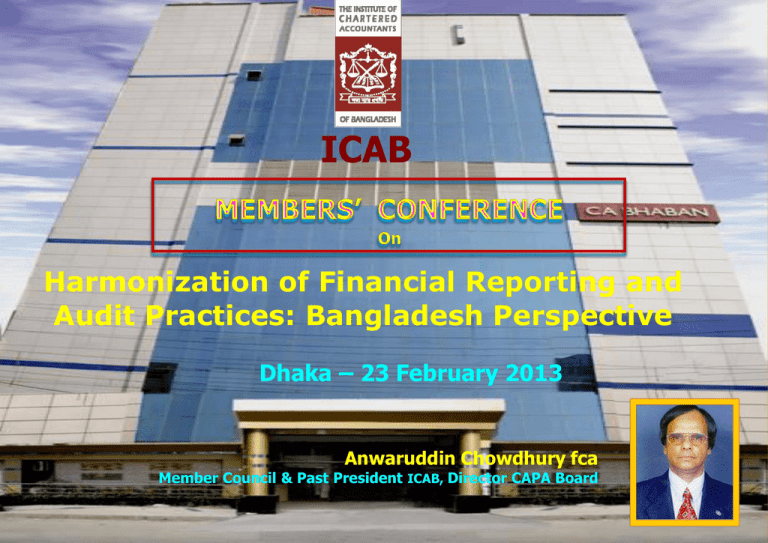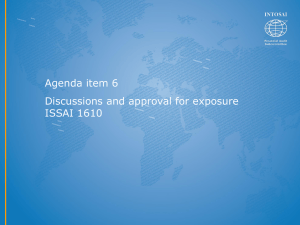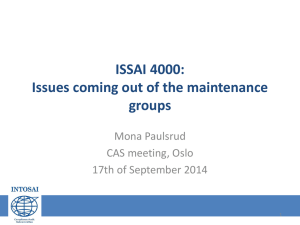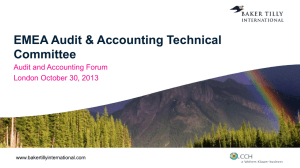harmonization of financial reporting and audit practices
advertisement

ICAB Harmonization of Financial Reporting and Audit Practices: Bangladesh Perspective Dhaka – 23 February 2013 Anwaruddin Chowdhury fca Member Council & Past President ICAB, Director CAPA Board Regulators, Standards Setters & Professional Bodies 2 3 4 5 6 7 8 9 PREAMBLE Recent Developments – Impact on FR & AP Global Scenario – Economic Recession (DAVOS/IMF) Global Financial Crisis/ Euro zone Debt Crisis • • • • Regulatory Failure – Sub-prime Lending / Derivatives • • • Important Role of Accountants - Global Recovery G-20 Pittsburg Summit 2009 Declaration Critical Nature of Financial Markets Convergence to Globally Harmonized High Quality Independent Accounting/FR Standards Simplification of FI Standards Lessons Learnt & Way Forward 10 PREAMBLE Political implications of 9/11 Corporate Frauds of New Millennium – Enron Corporate Governance Failures (Greed) Role of Auditors and Rating Agencies Collapse of Arthur Andersons ? Lessons Learnt / Way Forward Strengthening CG Practices Oversight Regulatory Bodies ASEAN Financial Crisis (late 90s) Inadequacy of Financial Reporting Lessons Learnt / Way Forward 11 IAS/IFRS AND ISA –GLOBAL ACCOUNTING/ REPORTING AND AUDIT CODES FOR HARMONIZATION OF FR & AP Moving to IAS/IFRS – Rationale. Forces Driving Harmonization Accounting as ‘lingua franca’ –Dimensions Role of IASB & IFAC (IAASB/IPSASB) Role of IOSCO Role of ISAR Role INTOSAI 12 HARMONIZATION OF ACCOUNTING AND FINANCIAL REPORTING PRACTICES /POSITIVE DIMENSION Forces Driving Harmonization General Considerations Significance of IFRS Harmonization Benefits of IFRS Harmonization Harmonization Benefits to Multinationals WTO Ministerial 1996 – Implications G-20 Pittsburg Summit Declaration European Convergence 2005 American Convergence 2015 ? 13 FACTORS DRIVING STANDARDIZATION Deregulation & Liberalization of Economies Accelerated Globalization Catalyzing Harmonization Entry by Multinational Corporations Increased External Competition Need for Regional/Global HFR&AP - Donors/Transparency/Corp Govnce. Foreign Competitiveness – FDI Increased Government/Society/Client Expectations Rapidly Evolving Inform. & Comm. Technologies Increased Clientele Knowledge & Changed Attitudes Global Economic Scenario –Recession (GFC/EDC) Transferability of Knowledge, Skills and Competence 14 INTERNATIONAL STANDARDS SETTING BODIES Standard Setting Bodies IFAC - IAASB = ISA/IAPS (Prvt Sec Aud Stds) - IPSASB= IPSAS (Publ Sec Accg Stds) IASB = IFRS (Prvt Sec Accg/FR Stds) INTOSAI = ISSAI (Publ Sec Aud Stds) UNCTAD ISAR = (Prvt Sec Accg Gudls) 15 STANDARDS SETTING/ADOPTION PROCESS Standard Setting Process IAS/IFRS ISA/IAPS ICAB Adoption Process BAS/BFRS BSA/BAPS IPSAS (OCAG) ISSAIs (OCAG) 16 INTERNATIONAL STANDARDS SETTING BODIES/PROCESS Accounting Auditing IASB IFAC (Steering Comm) (IAASB) (Exposure Drafts) IFRS (formerly IAS) (Discussion Drafts) ISA (and IAPS) 17 17 17 HARMONIZATION MEANING Harmonization of Financial Reporting refers to the process of standardized convergence through overcoming inconsistencies and narrowing differences in accounting principles and treatment (recognition and measurement) and presentation (disclosure) of items in Financial Statements. Harmonization of Audit refers to the process of standardized convergence through overcoming inconsistencies and narrowing differences in conducting the audit (methodology application) and reporting on the audit of Financial Statements (audit report). HFR&AP ensures greater accountability of management decisions and credible transparency of reported financial information thereby enhancing good governance in corporate sectors and providing reliable information to user groups (stakeholders) for decision making purposes. 18 NEED FOR IAS/IFRS HARMONIZATION Implementation of International Best Practices Global Convergence of Accounting/FR Regimes IOSCO Compliance- Cross Border Listing of Securities Enable Structured Uniform Presentation of FS Encourage Global Investment Opportunities Facilitate Cross-border Mergers and Acquisitions Credibility of FS by Regulators & Stakeholders Reduce Capital Cost for Foreign Companies Ensure Global Comparability of Financial Statements - Accounting Principles, Treatment (Recognition & Measurement) - Presentation/Disclosure of Items in FS 19 BENEFITS OF IFRS HARMONIZATION Global Comparability of Financial Information - Transparency Understandability - Relevance Reliability Access to Foreign Capital Markets Credibility of Domestic Capital Markets for FDI Reduced Cost of Capital to Foreign Companies Compliance with GATS/WTO Provisions Greater Objectivity in Audit of FS Reduced National Standard setting Costs. Local Implementation Guidelines, Adaptation Global Professional Credentials 20 HARMONIZATION BENEFITS TO MULTINATIONALS Improved Accessibility to Foreign Investor Funds. Improved Management Control Enhanced Appraisal Facilitation Ensures Foreign Stock Exchanges Compliance Permits Consolidation of Subsidiaries and Associates Audit Costs Reduction Transferability/Mobility of Accounting Personnel Determination of Global Tax Assessments 21 HARMONIZATION OF AUDITING PRACTICES General Considerations Stewardship System of Financial Reporting Audit Administration Methodology Significance of ISA Harmonization Benefits of ISA Harmonization 22 ACCOUNTABILITY FOR STEWARDSHIP SYSTEM OF FINANCIAL REPORTING Directors Auditor Shareholders Ownership Management 23 AUDIT ADMINISTRATION PROCESS Knowledge of Business Risk Assessment Letter of Engagement Initial Discussion Commencement of Audit Accounting System & Internal Control Planning Controlling Documentation Audit Methodology Evidencing Review of Financial Statements Post Audit Review Audit Report Completion of Audit Submission of Audit Report 24 HARMONIZATION OF PUBLIC SECTOR ACCOUNTING AND AUDITING PRACTICES Objectives & Dimensions Strengthening PSFM/Public Sector Accg & Audit OCAG Accounting & Auditing Function Implementation of D.E. Accrual Accounting Application of IPSAS in PS Accounts Application of ISSAIs in PS Audits Performance Audit/Environment/Forensic Audits 25 GOVT / PUBLIC SECTOR FINANCIAL ACCOUNANTABILITY Stakeholders Constitution Govt. Agencies SAI / CAG CAG FUNCT ACT-1974 Ownership Citizens 26 PUBLIC SECTOR PURVIEW IPSASB Framework “Public sector refers to Governments, Regional Government, Local Governments & Related Government entities including Agencies, Boards, Commissions & Enterprises” Bangladesh Public Sector - All Arena of Public Services: Government Ministries Divisions /Directorates / Departments Government Sub-Ordinate Offices Local Government Authorities Autonomous/Semi-Autonomous Bodies Public Sector Corporations Foreign Aided Projects (SCOPE/SPEMP B) State Owned Enterprises (SOEs) State Owned Bank (SOB) Hospitals/Educational Institutions etc. LGIs –City corps, Municip, UPs 27 IMPORTANCE OF FINANCIAL REPORTING SYSTEM FOR GOVERNMENTS / PUBLIC SECTOR Increased Accountability/Transparency of Public Funds Developing Public Sector Awareness of Govt. Spending Credibility of Financial Information for Public Trust Timeliness for Good Governance and Decisions Increased Credibility for Attracting FDI Assurance to Development Partners Improved Sovereign Rating Awards Efficient Financial Reporting Development & Public Welfare. System for Economic 28 GOVERNMENT PUBLIC SECTOR REPORTING - CASH / ACCRUAL ACCOUNTING Cash Flows Budget Cash Flows Actuals Revenues, Revenues, Expenses Expenses Budget Actuals Assets, Liabilities Assets, Liabilities Estimate Actuals Cash Accounting (SE) Accrual Accounting (DE) 29 CASH-BASIS IPSAS: TRANSITION STEP TO ACCRUAL IPSAS (OCAG BANGLADESH) Accrual Accounting IPSAS 1-32 (Accrual DE) Cash-Basis IPSAS (Transition Step) Current policies (Cash SE ) 30 ACCRUAL AND CASH ACCOUNTING : AN INTEGRATIVE APPORACH 31 PUBLIC SECTOR AUDITOR’S ROLE Determining Oversight Meet Expectations of Development Partners Facilitating Foresight Increasing Insight Conducting Objective Independent Financial Audit Conducting Performance/VMA Environment and IT Audit Enhancing Economy, Efficiency & Effectiveness of Resources Utilization of Audit Entities Ensuring Transparency of Financial Information Assuring Accountability of Management Decisions Combating Corruption, Misuse & Wastage 32 PUBLIC SECTOR AUDIT FOCUS Emphasis on Expenditure Availability of Budget Authorization By Competent Authority Payment Acknowledged By Right Person Government Rules And Procedures Complied Expenditures Properly Classified Justification Of Expenditures Emphasis on Cash Expenditures And Cash Income Not on Accruals (Cash Basis IPSAS) 33 PROSPECTIVE HARMONIZATION NEEDS Harmonization for SME Reporting Harmonization for NGO/MFIs Reporting Harmonization for Sustainability Reporting Harmonization for Integrated Reporting Harmonization for Alternative Financial System Harmonization for Other Forms of Reporting Entities 34 REGIONAL HARMONIZATION OF FINANCIAL REPORTING AND AUDIT PRACTICES South Asian Federation of Accountants (SAFA) Confederation of Asian & Pacific Accountants (CAPA) Role of Regional Harmonization Role Standardization of Adoption Process SAFA BPA & CG Awards – Positive Dimension ICAB National Awards for BPA&R – Catalyst for Best Presented Corporate Reports (Highest Winner in SAFA contest) 35 INSTITUTIONAL LEGAL REGULATORY FRAMEWORKS IN BANGLADESH Responsibility for Preparation & Audit of FS Legal Regulatory Framework - CA/SER/BCA/IA/Listing Rules - RJSC/SEC/BB/IDRA/Stock Exchanges ICAB - Role / Bye Laws Current Adoption Status – (Appendices) Legal Enforceability of Standards Implementation Status of Standards 36 FINANCIAL REPORTING IN BANGLADESH REGULATORY AND INSTITUTIONAL FRAMEWORK Annual FS are prepared and presented within a framework of recognized accounting principles, rules and regulations some mandatory some recommendatory. CA 1994 provides basic requirements for accounting and reporting of all companies - Silent about IAS/BAS. SER 1987 [Rule 12 (2) & (3)] requires mandatory compliance with the adopted IAS/IFRS and the ISA. BCA ‘91 mandates reporting formats and disclosures IA ‘12 Compliance requirements Govt Orders – Public Sector corporations/SOEs/SOBs NGOs and MFIs Accounting and Reporting Tax Laws Effecting FR Presentation (Non-Listed) 37 ADOPTION STATUS OF STANDARDS IAS/IFRS & IPSAS = Appendix I & III Total IAS Extant = 29 Total Adopted = 28 Not Adopted = 01 (Hyperinflation) Total IFRS Issued = 13 Total Adopted = 12 Not Adopted = 01 (Fin Ins) IFRS on SMEs = Adopted (1-1-13) IPSAS Issued 33 = Not Considered by ICAB (Cash IPSAS by OCAG) SIC/IFRIC = Not Adopted by ICAB 38 ADOPTION STATUS OF STANDARDS ISA /IAPs & ISSAIs – Appendix II & IV Total ISA Issued/Extant 36=All Adopted IAPS Issued & Adopted = 8 ISA Framework, BSQC1, Glossary = Adopted IFAC Code of Ethics, BSQC1 = Adopted IFAC SMOs (7) = Fully Compliant ISSASIs Issued 37 = Not Considered by ICAB (Implemented by OCAG) 39 ENFORCEABILITY STATUS OF ADOPTED STANDARDS Legal Mandate – Statutorily Enforceable for listed companies under SEC Rules 1987 (including Banks, Insur Cos & NBFIs). No legal observance requirement in CA/other statutes Professional Mandate – Not yet professionally mandatory/Enforceable through CA Bye-Laws 1973 Other Considerations 40 CHALLENGES AND PROSPECTS OF HARMONIZATION IN BANGLADESH Challenges/Limitations of Harmonization = Refer Conference Paper Major Challenges Opportunities /Prospects = Refer Conference Paper Major Prospects 41 MAJOR CHALLENGES Major Challenges - Standard Setting/Adoption stage Speedy adoption of IFRS & ISA suffers from lack of technical and financial resources. Existing laws sometime contrary to IFRS provisions, acting as major impediments to the adoption process. Fair Value Accounting Limitations – market imperfections; lack of familiarization, information flow and reliability of available data & stats. 42 MAJOR CHALLENGES Major Challenges at Implementation Stage Management Mindset –Averse to Changes Lack of awareness, understanding & application skills by preparers and auditors about IAS/IFRS and ISA Lack of accountability of management decisions and transparency of financial information Lack of resources, knowledge, technical skills and competence of regulatory agencies to monitor /enforce compliances with Standards. 43 MAJOR CHALLENGES Need for constant updating Fund and technical resource constraints to monitor implementation of IAS/IFRS & ISA Lack of mandatory legal compliance provisions Lack of implementation guidelines for BAS/BFRS Low level of audit fees Demand–supply gap of qualified accountants FVA limitations-market imperfections Concerted training program on IAS/IFRS and ISA Capacity building and institutional development of regulatory agencies and professional bodies Technical assistance for training Mandate Professional enforceability of standards 44 MAJOR PROSPECTS Mindset Changes – Regulators/Business Entities Transformation of Corporate Culture Significant Improvement in Financial Reporting Practices SAFA BPA & CG Awards- Positive Dimension ICAB National Awards for BPAR- Catalyst for Remarkable Corporate Reporting Harmonization Corporate Governance Practices Role of SAFA/CAPA in Regional Harmonization Credit Rating Requirement QAB -Incentivization for Harmonization Proactive Role of ICAB : - PPP for Improved Quality Assurance with OCAG - Training of NBR/BB Officials/ Others Agencies 45 POLICY ISSUES & RECOMMENDATIONS Policy Issues & Recommendations = Refer Conference Paper Major Issues & Recommendations NO FRA / FRC B = Superimposition of Redundant Oversight Body 46 MAJOR ISSUES AND RECOMMENDATIONS Composition of multi-disciplinary Task Force for HFR&AP Different reporting regimes need to be established for: Public limited companies (listed & unlisted) Large private companies Small & medium sized entities (SMEs) State owned enterprise (SOEs) NGOs & MFIs Other Forms of entities- Cooperatives Strategic Project - capacity building/institutional development project should be undertaken of ICAB TRC & QAB of ICAB should be strengthened Effective Seminars/Workshops – Stds Dissemination Preparation of Implementation Guidelines for Stds 47 MAJOR ISSUES AND RECOMMENDATIONS SAFA/CAPA platform for regional Harmonization Mandatory implementation of Corporate Governance Listed Cos must employ qualified accountants Audit/Professional Fees Enhancement Awareness of IAS/IFRS & ISA in Entities & Auditors practices (codes) for strengthening HFR&AP Broadening credit rating mandate Refer Conference Paper 48 THE WAY FORWARD Enabling Environment for Application of Standards Capacity Building/Strengthening of Institutions Regulatory Mandate for Application of Standards Establish SEC/ICAB Joint Monitoring Board Stimulate Changes Leadership Decisions for HFR&AP Strengthening Learning Partnership with ICAEW OCAG PPP for Improved AQA Knowledge Sharing Impart Knowledge Sharing Training (NBR/BB) Adequate Implementation of ICAB Strategic Plans Finalization of ICAB Council Composition Reforms Top Priority – No Superimposition of FRC 49 CONCLUSION Application of harmonized Standards impact positive dimension for achievement of qualitative characteristics to reflect high quality globally comparable true & fair view Financial Statements Standard-setting/adoption should be sustained as a progressively continuous process Government must legislate, the Business, Profession and Regulators must work cohesively to ensure convergence onto IAS/IFRS & ISA - thereby playing their due roles for HFR&AP Think global > See regional > Act local 50 Will IR get off the ground ? Looks Like –Yes, (If so-How and When ? Implications ?) (If not –Reasons & Remedies ?) HAPPY FINANCIAL REPORTING AND AUDIT PRACTICES HARMONIZATION ENHANCE THE PROFESSIONAL IMAGE MEET CHALLENGES & UTILIZE OPPORTUNITIES ALL THE VERY BEST APENDICES Appendix I (A) - Adoption Status of International Accounting Standards (IAS) by ICAB as Bangladesh Accounting Standards (BAS) IAS/ BAS Title of Adopted IAS as BAS Effective DateApplicable on or after 1 Jan 2007 1 Presentation of Financial Statements 2 Inventories 1 Jan 2007 7 Statement of Cash Flows 1 Jan 1999 8 1 Jan 2007 10 Accounting Policies, Changes in Accounting Estimates and Errors Events After the Reporting Period 11 Construction Contracts 1 Jan 1999 12 Income Taxes 1 Jan 1999 16 Property, Plant and Equipment 1 Jan 2007 17 Leases 1 Jan 2007 18 Revenue 1 Jan 2007 19 Employee Benefits 1 Jan 2004 20 Accounting for Government Grants and Disclosure of Govt Assc The Effects of Changes in Foreign Exchange Rates 1 Jan 1999 21 1 Jan 1999 1 Jan 2007 53 IAS/ BAS Title of Adopted IAS as BAS 23 Borrowing Costs Effective DateApplicable on or after 1 Jan 2010 24 Related Party Disclosures 1 Jan 2007 26 27 Accounting and Reporting by Retirement Benefit 1 Jan 2007 Plans Consolidated and Separate Financial Statements 1 Jan 2010 28 Investments in Associates 1 Jan 2007 29 Financial Reporting in Hyperinflationary Economics Not adopted 31 Interests in Joint Ventures 1 Jan 2007 32 Financial Instruments: Presentation 1 Jan 2010 33 34 36 Earnings per Share Interim Financial Reporting Impairment of Assets 1 Jan 2007 1 Jan 1999 1 Jan 2005 37 38 Provisions, Contingent Liabilities and Contingent 1 Jan 2007 Assets Intangible Assets 1 Jan 2005 39 40 Financial Instruments: Recognition and Measurement 1 Jan 2010 Investment Property 1 Jan 2007 41 Agriculture 1 Jan 2007 54 Appendix I (B) - Adoption Status of International Financial Reporting Standards (IFRS) by ICAB as Bangladesh Financial Reporting Standards (BFRS) SL # 1 IFRS BFRS BFRS 1 2 First-time Adoption of IFRS Effective DateApplicable on or after 1 Jan 2009 BFRS 2 Share-based Payment 1 Jan 2007 3 BFRS 3 Business Combinations 1 Jan 2010 4 BFRS 4 Insurance Contracts 1 Jan 2010 5 BFRS 5 6 BFRS 6 7 BFRS 7 Non-current Assets Held for Sale and 1 Jan 2007 Discontinued Operations Exploration & evaluation of Mineral 1 Jan 2007 Resources Financial Instruments: Disclosures 1 Jan 2010 8 BFRS 8 Operating Segments 1 Jan 2010 9 IFRS 9 Financial Instruments Not Adopted 10 BFRS 10 Consolidated Financial Statements 1 Jan 2013 11 BFRS 11 Joint Arrangements 1 Jan 2013 12 BFRS 12 13 BFRS 13 Disclosure of Interests Entities Fair Value Measurement IFRS for SMEs / Title of Adopted IFRS as BFRS in Other 1 Jan 2013 BFRS for SMEs (Small Medium Size 1 Jan 2013 Entities) 55 Appendix- II (A) - Adoption Status of International Standards on Auditing (ISA) by ICAB as Bangladesh Standards on Auditing (BSA) Sl. # ISA/BSA ISA/ BSA Title 1 200 2 210 Overall Objectives of the Independent Auditor and the Conduct of an Audit in Accordance with ISA Agreeing the Terms of Audit Engagements 3 220 Quality Control for an Audit of Financial Statements 4 230 Audit Documentation 5 240 6 250 7 260 The Auditor's Responsibilities Relating to Fraud in an Audit of Financial Statements Consideration of Laws and Regulations in an Audit of Financial Statements Communication with Those Charged with Governance 8 265 9 300 10 315 11 320 Identifying & Assessing Risks of Material Understanding Entity and its Environment Materiality in Planning and Performing an Audit 12 330 The Auditor’s Responses to Assessed Risks 13 402 Audit Considerations Relating to Entities Using Service Organization Communicating Deficiencies in Internal Control to Those Charged with Governance and Management Planning an Audit of Financial Statements Misstatement - 56 Sl. # ISA/BSA ISA/ BSA Title 14 450 Evaluation of Misstatements Identified during the Audit 15 16 500 501 Audit Evidence Audit Evidence—Specific Considerations for Selected Items 17 18 19 20 21 505 510 520 530 540 External Confirmations Initial Audit Engagements—Opening Balances Analytical Procedures Audit Sampling Auditing Accounting Estimates, Including Fair Value Accounting Estimates, and Related Disclosures 22 23 24 25 26 550 560 570 580 600 27 610 Related Parties Subsequent Events Going Concern Written Representations Special Considerations—Audits of Group FS (including Work of Component Auditors) Using the Work of Internal Auditors 28 620 Using the Work of an Auditor’s Expert 29 700 Forming an Opinion and Reporting on Financial Statements 57 Sl. # ISA/BSA ISA/ BSA Title 30 705 31 706 32 710 33 720 34 800 35 805 36 810 Modifications to the Opinion in the Independent Auditor’s Report Emphasis of Matter Paragraphs and Other Matter Paragraphs in the Independent Auditor’s Report Comparative Information—Corresponding Figures and Comparative FS The Auditor’s Responsibilities Relating to Other Information in Documents Containing Audited FS Special Considerations—Audits of FS Prepared in Accordance with Special Purpose Frameworks Special Considerations –Audits of Single FS and Specific Elements, Accounts or Items of FS Engagements to Report on Summary Financial Statements Total BSA / Code of Ethics /BSQC 1 /Framework 58 Appendix II (B) - Adoption Status of International Auditing Practice Statements (IAP by ICAB as Bangladesh Auditing Practice Statements (BAPS) Sl. # IAPS/ BAPS Title BAPS 1 1000 Inter-Bank Confirmation Procedures 2 1004 The Relationship Between Banking Supervisors and Banks’ External Auditors 3 1005 The Special Considerations in the Audit of Small Entities(withdrawn in 2010) 4 1006 Audits of the Financial Statements of the Banks 5 1010 The Consideration of Environmental Matters in Audit of Financial Statements 6 1012 Auditing Derivative Financial Statements 7 1013 Electronic Commerce-Effect on the Audit of Financial Statements 8 1014 Reporting by Auditors on Compliance with IFRS (withdrawn in 2010) 59 Appendix III - International Public Sector Accounting Standards (IPSAS) 2011 (Not Adopted by ICAB) Cash Basis IPSAS—Financial Reporting Under the Cash Basis of Accounting IPSAS 1—Presentation of Financial Statements IPSAS 2—Cash Flow Statements IPSAS 3—Accounting Policies, Changes in Accounting Estimates and Errors IPSAS 4—The Effects of Changes in Foreign Exchange Rates IPSAS 5—Borrowing Costs IPSAS 6—Consolidated and Separate Financial Statements IPSAS 7—Investments in Associates IPSAS 8—Interests in Joint Ventures IPSAS 9—Revenue from Exchange Transactions IPSAS 10—Financial Reporting in Hyperinflationary Economies IPSAS 11—Construction Contracts IPSAS 12—Inventories IPSAS 13—Leases IPSAS 14—Events after the Reporting Date IPSAS 15—Financial Instruments: Disclosure and Presentation IPSAS 16—Investment Property 60 Appendix III - International Public Sector Accounting Standards (IPSAS) 2011 (Not Adopted by ICAB) Cash Basis IPSAS—Financial Reporting Under the Cash Basis of Accounting IPSAS 17—Property, Plant, and Equipment IPSAS 18—Segment Reporting IPSAS 19—Provisions, Contingent Liabilities and Contingent Assets IPSAS 20—Related Party Disclosures IPSAS 21—Impairment of Non-Cash-Generating Assets IPSAS 22—Disclosure of Financial Information about the General Government Sector IPSAS 23—Revenue from Non-Exchange Transactions (Taxes and Transfers) IPSAS 24—Presentation of Budget Information in Financial Statements IPSAS 25—Employee Benefits IPSAS 26—Impairment of Cash-Generating Assets IPSAS 27—Agriculture IPSAS 28—Financial Instruments: Presentation IPSAS 29—Financial Instruments: Recognition and Measurement IPSAS 30—Financial Instruments: Disclosures IPSAS 31—Intangible Assets IPSAS 32—Service Concession Arrangements - Guarantor 61 Appendix IV- INTOSAI International Standards of Supreme Audit Institutions (ISSAI). Not Adopted by ICAB/ Implemented by OCAG? ISSAI 1000 – General Introduction to the INTOSAI Financial Audit Guidelines ISSAI 1003 – Glossary of Terms to the INTOSAI Financial Audit Guidelines ISSAI 1200 – Overall Objectives of the Independent Auditor and Conduct of Audit in Accordance with ISA ISSAI 1210 – Agreeing the Terms of Audit Engagements ISSAI 1220 – Quality Control for an Audit of Financial Statements ISSAI 1230 – Audit Documentation ISSAI 1240 – The Auditor’s Responsibilities Relating to Fraud in an Audit of Financial Statements ISSAI 1250 – Consideration of Laws and Regulations in an Audit of Financial Statements ISSAI 1260 – Communication with Those Charged with Governance ISSAI 1265 – Communicating Deficiencies in Internal Control to Those with Governance and Management ISSAI 1300 – Planning an Audit of Financial Statements ISSAI 1315 – Identifying and Assessing Risks of Material Misstatements by Understanding Entity Environment 62 Appendix IV- INTOSAI International Standards of Supreme Audit Institutions (ISSAI). Not Adopted by ICAB/ Implemented by OCAG? ISSAI 1000 – General Introduction to the INTOSAI Financial Audit Guidelines ISSAI 1320 – Materiality in Planning and Performing an Audit ISSAI 1330 – The Auditor’s Responses to Assessed Risks ISSAI 1402 – Audit Considerations Relating to an Entity Using a Service Organization ISSAI 1450 – Evaluation of Misstatements Identified during the Audit ISSAI 1500 – Audit Evidence ISSAI 1501 – Audit Evidence – Specific Considerations for Selected Items ISSAI 1505 – External Confirmations ISSAI 1510 – Initial Audit Engagements – Opening Balances ISSAI 1520 – Analytical Procedures ISSAI 1530 – Audit Sampling ISSAI 1540 – Auditing Accounting Estimates, Including Fair Value Accounting Estimates and Related Disclosures ISSAI 1550 – Related Parties ISSAI 1560 – Subsequent Events ISSAI 1570 – Going Concern ISSAI 1580 – Written Representations 63 Appendix IV- INTOSAI International Standards of Supreme Audit Institutions (ISSAI). Not Adopted by ICAB/ Implemented by OCAG? ISSAI 1000 – General Introduction to the INTOSAI Financial Audit Guidelines ISSAI 1600 – Special Considerations – Audits of Group Financial Statements (Incl. Work of Component Auditors) ISSAI 1610 – Using the Work of Internal Auditors ISSAI 1620 – Using the Work of an Auditor’s Expert ISSAI 1700 – Forming an Opinion and Reporting on Financial Statements ISSAI 1705 – Modifications to the Opinion in the Independent Auditor’s Report ISSAI 1706 – Emphasis of Matter Paragraphs and Other Matter Paragraphs in Independent Auditor’s Report ISSAI 1710 – Comparative Information – Corresponding Figures and Comparative Financial Statements ISSAI 1720 – The Auditor’s Responsibilities Relating to Other Information in Documents Containing Audited FS ISSAI 1800 – Special Considerations – Audits of FS Prepared in Accordance with Special Purpose Frameworks ISSAI 1805 – Special Considerations – Audits of Single FSt and Specific Elements, Accounts or Items of FS ISSAI 1570 – Going Concern 64








